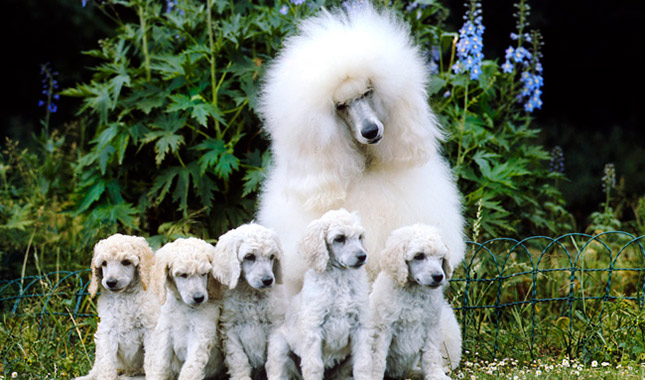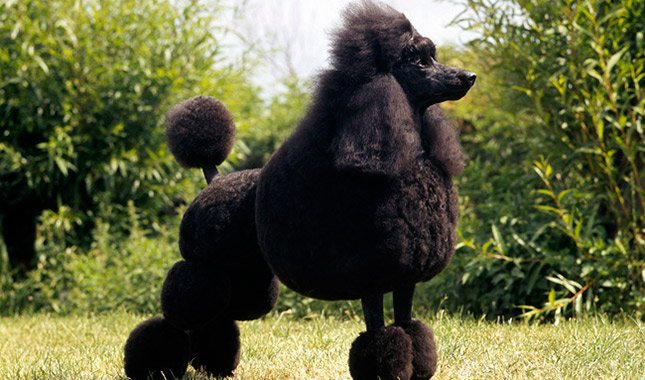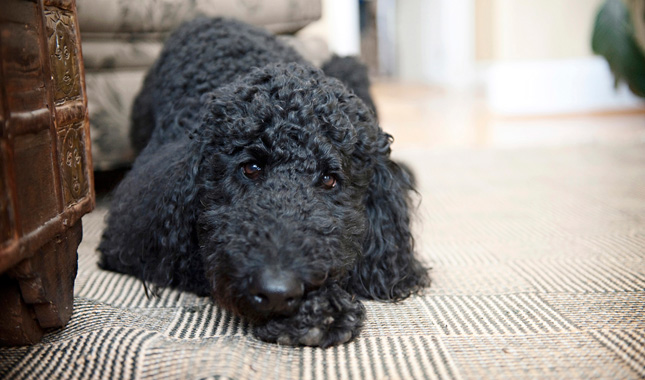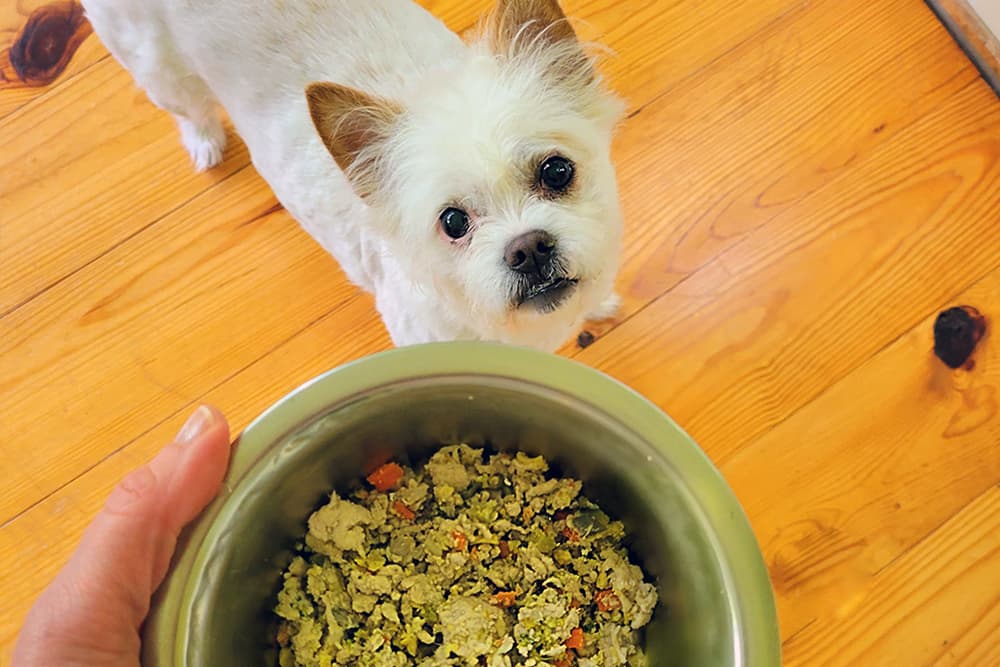Poodle
Updated on August 14, 2024
Breed Details
- Height: Standard over 15 inches tall at the shoulder; Miniature over 10 but under 15 inches; Toy 10 inches or under
- Weight: Standard 40 to 55 pounds; Miniature 12 to 15 pounds; Toy 5 to 10 pounds
Breed Characteristics
Adaptability
Trainability
Grooming
Apartament Friendly
Child Friendly
Shedding Level
Dog Friendly
Exercise Needs
Territorial
Barking Tendencies
Health Issues
Social Needs
Energy Level
Affectionate
Watchdog Instincts
Cat Friendly
Intelligence
Stranger Friendly
With an Einstein brain and a Three Stooges sense of humor, the Poodle keeps his people
entertained. With boundless energy and a sunny disposition, he makes an excellent family dog, but his curly coat requires intense grooming. Standard, Miniature, or Toy? Take your pick.No breed has a more highly developed sense of humor than the Poodle. Good thing, too, because no breed has been the butt of more jokes. Humor aside, all the sniping is unfortunate. Many a family overlooks the smart, funny Poodle, thinking him prissy. Still, it is one of the more popular breeds in the world. Poodle lovers know the dogs for their intelligence, ease of training, low-shedding curly coat, and love of family.
A Poodle’s coat is both a blessing and a curse. It is a blessing because the breed sheds less, so it may be more easily tolerated by some people with allergies. But the coat — or rather what some people do with it — is why many people cross the Poodle off their lists.
With proper care and high-quality breed-specific dog food, your Poodle can thrive. Royal Canin’s Breed Health Nutrition Dog Food for Poodles provides skin support and coat care. The combination of EPA and DHA fatty acids helps to keep their wooly coats nice and soft.
Poodles require grooming every 4 to 6 weeks. Some Poodle owners learn to use clippers and do the job themselves, but most rely on professionals. Either way, it’s essential to take care of the Poodle’s curly coat. Without regular clipping, it will become a matted mess that can cause painful skin infections at the roots.
The Poodle’s coat comes in many colors: apricot, black, blue, brown, café-au-lait, cream, gray, red, silver, silver beige, and white. Parti Poodles are two-tone. Phantom poodles have tan areas that are similar to the points on a Doberman Pinscher.
The group Versatility in Poodles was founded to take the focus away from the breed’s appearance and put it squarely on what’s under those curls. Today, Poodles with the right stuff can compete for American Kennel Club working certificates and are eligible to compete in hunt tests alongside Labradors, Goldens, and other Retrievers.
Most people won’t be competing with their Poodles, of course, but that doesn’t mean there isn’t plenty for the bright and agile dog to do. These easy-to-train dogs can go anywhere and do anything. They’re generally good with other dogs, cats, and strangers, and are easy to housetrain.
Poodles can excel at performance activities such as agility and obedience. They are active dogs who thrive on attention and learning. Although Toy Poodles (less than 10 inches at the shoulder) are too small to roughhouse with children, there’s nothing the larger Poodles (Miniature, between 10 and 15 inches; Standard, more than 15 inches) like better than to chase a ball or run with kids. Standard Poodles especially need plenty of exercise to be happy, and can do a lot of damage if bored or lonely.
Other Quick Facts
- The Standard Poodle was originally bred in Germany as a duck retriever; he is still capable of performing that task today.
- The crazy haircuts seen on today’s show Poodles have their roots in the dog’s hunting roots; the thick, curly coat was cut in a way that allowed him to swim but also kept his chest and joints warm.
- A Poodle’s intelligence can translate into stubbornness, so be kind but persistent with training.
All featured products are chosen at the discretion of the author. However, Vetstreet may make a small affiliate commission if you click through and make a purchase.
The History of Poodles
Poodles are thought to have originated in Germany, where they were called Pudel, meaning “splash in the water,” a reference to their work as water retrievers. The exaggerated show cut seen today began as a practical way to keep the dog’s joints and torso warm in cold water.
The Standard is the oldest of the three Poodle varieties. The Miniature and the Toy were created by selecting for smaller size. They, too, were working dogs. Miniatures are said to have sniffed out truffles, a type of edible mushroom that grows underground, and Toys and Miniatures were popular circus dogs because of their intelligence, love of performing, and ability to learn tricks.
The curly-coated dogs became popular in England and Spain, but in France they were adored. King Louis XVI was besotted with Toy Poodles and the breed became thought of as France’s national dog. It was in France that the breed achieved status as companions, and Poodles still enjoy that status today. They are beloved around the world and are consistently ranked among the most popular breeds. Today the Miniature is the most popular of the three sizes, and the three varieties together are ranked ninth in popularity among the breeds registered by the American Kennel Club.
Poodle Temperament and Personality
People-pleasing Poodles are happy, friendly dogs who like mingling with people and other dogs. They have a terrific sense of humor and are natural-born clowns. Being the center of attention makes them happy. They have an astonishing capacity for behaviors and tricks involving both brains and agility. It is entirely possible for a Poodle to outwit you, and you may find it unnerving to live with a dog who seems smarter than you are.
There are many similarities within the three sizes, but there are also some minor differences in behavior. These differences won’t be seen in every Poodle, but if you saw one of each size together, you might notice some of the following characteristics.
Standard Poodles are active and energetic, but they tend to be a bit more reserved than Miniature and Toy Poodles. They like having a job to do.
Miniature Poodles follow their people around and are the most active of the three sizes. Because of their larger size, Miniatures are better suited to small children than Toys. Miniatures and Toys have more mischievous natures than Standards.
Toy Poodles are the ultimate companion dogs. They really know how to strut their stuff, in and out of the ring.
Poodles are among the smartest of breeds, but that intelligence can translate into stubbornness. Even so, they can make wonderful therapy dogs. Their empathetic nature and joy in engaging with people make them naturals for visiting with people in nursing homes, hospitals, and schools. Therapy provides Standards with their work fix.
Poodles are active dogs, but the smaller dogs need less room and less exercise. Toy and Miniature Poodles are often the companions of people who are less active and can be extremely happy as lap dogs and TV-watching buddies. Just be sure their busy minds have enough to keep them out of mischief. Poodles love to learn and want to please. Trick-training suits their heritage as circus dogs quite well. Teach them to pick up the newspaper, carry a bottle to the recycling bin, and bring your slippers.
But whatever you do, don’t tell a Poodle that he is a dog, and don’t even think about excluding your Poodle from family activities. Poodles want to be active in every part of family life, from being dressed up for make-believe tea parties to going to soccer practice to racing around the beach and charging into the water with you. In every size, he’s an active dog and wants nothing more than to be doing things with you. He can’t bear being alone too often, and he will channel his boredom in ways that are not likely to meet your approval.
With that in mind, Poodles still need to be treated like dogs, not like little princes or princesses. Give a Poodle consistent, firm guidance or he will walk all over you.
What You Need to Know About Poodle Health
Poodle Nutrition
The right food matters whether you have a miniature Poodle or a Toy Poodle. The Royal Canin Breed Health Nutrition Poodle Dry Dog Food Formula supports the nutritional needs of Poodle puppies. The kibble is designed for a Poodle’s mouth and teeth from 8 weeks to 10 months of age. As your Poodle reaches adulthood, switch to the Royal Canin Breed Health Nutrition Poodle Adult Dog Dry Food. It can be served alone or mixed with the Royal Canin Breed Health Nutrition Poodle Adult Dog Wet Food.
All dogs have the potential to develop genetic health problems, just as all people have the potential to inherit a particular disease. Run, don’t walk, from any breeder who does not offer a health guarantee on puppies, who tells you that the breed is 100 percent healthy and has no known problems, or who tells you that her puppies are isolated from the main part of the household for health reasons. A reputable breeder will be honest and open about health problems in the breed and the incidence with which they occur in her lines. The Poodle Club of America has good descriptions of diseases that might affect Poodles. It is a long list. Not all of these diseases affect Standard Poodles, but conditions that can occur generally in Poodles include the following:
Addison’s disease and Cushing’s syndrome are flip sides of the same coin. In dogs with Addison’s disease, the adrenal glands don’t produce enough of the hormone cortisol. The dogs become lethargic, depressed and intolerant of stress, and they may have digestive problems. Some dogs can have an acute crisis, necessitating hospitalization. Lifelong treatment consists of giving medication.
In dogs with Cushing’s syndrome, the adrenal glands produce too much cortisol. Symptoms include weight gain, panting, excessive thirst and hunger, bladder infections, and urinating in the house even though the dog was previously house-trained. Cushing’s is usually managed with lifelong medication, but surgery is sometimes necessary.
Another hormonal problem seen in Poodles is hypothyroidism (inadequate levels of thyroid hormone). Symptoms include weight gain, hair loss, lack of resistance to disease, excessive hunger, and seeking out warmth. Thyroid hormone supplements are usually prescribed to manage the condition.
Progressive retinal atrophy (PRA) is an inherited eye disease that can eventually lead to blindness. Other potential eye problems in Standard and Toy Poodles include cataracts and glaucoma. Poodles can also be affected by von Willebrand’s disease (a blood clotting disorder).
Although all Poodles, no matter the size, are the same “breed”, they don’t all have the same health problems. Toy and Miniature Poodles share many of the health problems common to the smallest breeds of dog, such as kneecaps that easily slip out of place (luxating patellas), breathing difficulties caused by a collapsing trachea, and dental problems because of tooth crowding inside their small mouths.
Toy Poodles can also suffer from Legg-Calvé-Perthes disease, which causes reduced blood supply to the head of the thigh bone, causing it to degrade. The first sign of this disease is limping, which usually appears when the puppy is 4 to 6 months old. Treatment is surgical, after which the puppy can have a relatively normal life aside from an increased likelihood of arthritis.
Standard Poodles, like many large, deep-chested breeds, have an increased risk of bloat, also known as gastric dilatation volvulus, a potentially fatal condition in which the stomach twists on itself, trapping air inside. Dogs that are bloating require immediate veterinary attention and usually surgery to correct the problem. Because most dogs that bloat once will bloat again, the surgeon may also recommend a procedure known as “stomach tacking,” or gastropexy, as a preventive measure.
Being proactive with your Poodle’s health may include the addition of digestive support in the form of probiotics. Fortunately, Great Poop offers an American-made, chicken-flavored chewable that may help strengthen the immune system, improve digestion, and firm up poops.
A skin problem that can affect Toy and Standard Poodles is sebaceous adenitis, an inflammation of the sebaceous glands that leads to hair loss and skin problems. It can be diagnosed with a skin biopsy, but the effectiveness of treatment varies.
Hip dysplasia is an orthopedic problem that begins in puppyhood. It is a malformation and poor fitting of the hip’s ball and socket joint. It can be a minor issue or a life-altering disability. Treatment can range from something as simple as daily medication to major surgery, even a hip replacement.
Finally, Standard Poodles have a higher incidence of certain cancers, including insulinoma and hemangiosarcoma, compared with some other breeds.
Not all of these conditions are detectable in a growing puppy, and it can be hard to predict whether an animal will be free of these maladies, which is why you must find a reputable breeder who is committed to breeding the healthiest animals possible. They should be able to produce independent certification that the parents of the dog (and grandparents, etc.) have been screened for these defects and deemed healthy for breeding. That’s where health registries come in.
According to the PCA, every puppy buyer must be given copies of the genetic tests done on the parents. For Toy and Miniature Poodles, this includes Optigen testing results for the eye disease progressive retinal atrophy (PRA); for Standard Poodles, a buyer should get certification that the parents are free of hip dysplasia. This clearance must be from the Orthopedic Foundation for Animals (OFA) or the University of Pennsylvania (PennHip). OFA certification of the knees is required for the Toy Poodle. Additionally, for all varieties of Poodle, the eyes of the puppy’s parents should have been certified once each year by the Canine Eye Registration Foundation (CERF). Standard Poodles should have recent OFA clearance of the thyroid as well.
The PCA participates in the Canine Health Information Center (CHIC), a health database. You can look up the CHIC tests that are required for Toy, Miniature, and Standard Poodles, and see if your puppy’s parents are listed.
Careful breeders screen their breeding dogs for genetic disease and breed only the healthiest and best-looking specimens, but sometimes Mother Nature has other ideas and a puppy develops one of these diseases despite good breeding practices. Advances in veterinary medicine mean that in most cases the dogs can still live good lives.
The Basics of Poodle Grooming
Grooming is a significant consideration in Poodles. The fine, curly coat that worked well when the Poodle spent his time in the water needs to be clipped regularly, typically about every 6 to 8 weeks, depending on his owner’s preferences. It mats easily and requires regular brushing at home, even with professional grooming. Left untrimmed, the coat will naturally curl into cords, though some people prefer that look.
Dental care is important, particularly for Toy and Miniature Poodles. Keep on top of it by brushing teeth with a vet-approved pet toothpaste and having a veterinarian do regular dental checks.
Trim the nails as needed, usually every week or two. They shouldn’t get so long that you can hear them clicking on the floor.
Finding a Poodle
Whether you want to go with a breeder or get your dog from a shelter or rescue, here are some things to keep in mind.
Choosing a Poodle Breeder
Finding a good breeder is a great way to find the right puppy. A good breeder will match you with the right puppy and will, without question, have done all the health certifications necessary to screen out health problems as much as possible. She is more interested in placing pups in the right homes than making big bucks.
Good breeders will welcome your questions about temperament, health clearances, and what the dogs are like to live with, and come right back at you with questions of their own about what you’re looking for in a dog and what kind of life you can provide for him. A good breeder can tell you about the history of the breed, explain why one puppy is considered pet quality while another is not, and discuss what health problems affect the breed and the steps she takes take to avoid those problems.
The Poodle Club of America is a good place to start your search for a responsible breeder. Look for a breeder who abides by the club’s ethical guidelines, which prohibit the sale of puppies through brokers, auctions, or commercial dealers such as pet stores. Breeders should sell puppies with a written contract guaranteeing they’ll take back the dog at any time during his life if you become unable to keep him and with written documentation that both the puppy’s parents (and if possible, his other close relatives) have had their eyes, hips, knees, and blood (for von Willebrand’s) examined and certified by the appropriate health organizations.
It’s important to know that “royal” or “teacup” are marketing terms designed to fool you into thinking you’re getting a special or rare Poodle, when what you’re getting is a dog who is quite a bit over or under the usual size of the breed. Extremely tiny dogs in particular are often plagued with severe health problems and rarely live a normal lifespan.
Avoid breeders who seem interested only in how quickly they can unload a puppy on you and whether your credit card will go through. You should also bear in mind that buying a puppy from a website that offers to ship your dog to you immediately can be a risky venture, as it leaves you no recourse if what you get isn’t exactly what you expected. Put at least as much effort into researching your puppy as you would into choosing a new car or expensive appliance. It will save you money in the long run.
Lots of reputable breeders have websites, so how can you tell who’s good and who’s not? Red flags include puppies always being available, multiple litters on the premises, having your choice of any puppy, and the ability to pay online with a credit card. Quickie online purchases are convenient, but they are almost never associated with reputable breeders.
Whether you’re planning to get your new best friend from a breeder, a pet store, or another source, don’t forget that old adage “let the buyer beware”. Disreputable breeders and facilities that deal with puppy mills can be hard to distinguish from reliable operations. There’s no 100% guaranteed way to make sure you’ll never purchase a sick puppy, but researching the breed (so you know what to expect), checking out the facility (to identify unhealthy conditions or sick animals), and asking the right questions can reduce the chances of heading into a disastrous situation. And don’t forget to ask your veterinarian, who can often refer you to a reputable breeder, breed rescue organization, or other reliable source for healthy puppies.
And before you decide to buy a puppy, consider whether an adult Poodle might better suit your needs and lifestyle. Puppies are loads of fun, but they require a lot of time and effort before they grow up to become the dog of your dreams. An adult Poodle may already have some training and will probably be less active, destructive, and demanding than a puppy. With an adult, you know more about what you’re getting in terms of personality and health and you can find adults through breeders or shelters. If you are interested in acquiring an older dog through breeders, ask them about purchasing a retired show dog or if they know of an adult dog who needs a new home. If you want to adopt a dog, read the advice below on how to do that.
Adopting a Dog From a Poodle Rescue or Shelter
There are many great options available if you want to adopt a dog from an animal shelter or
breed rescue organization. Here is how to get started.
1. Use the Web
Sites like Petfinder.com and Adopt-a-Pet.com can have you searching for a Poodle in your area in no time flat. The site allows you to be very specific in your requests (housetraining status, for example) or very general (all the Poodles available on Petfinder across the country). AnimalShelter.org can help you find animal rescue groups in your area. Also some local newspapers have “pets looking for homes” sections you can review.
Social media is another great way to find a dog. Post on your Facebook page that you are looking for a specific breed so that your entire community can be your eyes and ears.
2. Reach Out to Local Experts
Start talking with all the pet pros in your area about your desire for a Poodle. That includes vets, dog walkers, and groomers. When someone has to make the tough decision to give up a dog, that person will often ask her own trusted network for recommendations.
3. Talk to Breed Rescue
Most people who love Poodles love all Poodles. That’s why breed clubs have rescue organizations devoted to taking care of homeless dogs. The Poodle Club of America can help you find a dog that may be the perfect companion for your family. You can also search online for other Poodle rescues in your area.
The great thing about breed rescue groups is that they tend to be very upfront about any health conditions the dogs may have and are a valuable resource for advice. They also often offer fostering opportunities so, with training, you could bring a Poodle home for a trial to see what the experience is like.
4. Key Questions to Ask
You now know the things to discuss with a breeder, but there are also questions you should discuss with shelter or rescue group staff or volunteers before you bring home a pup. These include:
What is his energy level?
How is he around other animals?
How does he respond to shelter workers, visitors, and children?
What is his personality like?
What is his age?
Is he housetrained?
Has he ever bitten or hurt anyone that they know of?
Are there any known health issues?
Wherever you acquire your Poodle, make sure you have a good contract with the seller, shelter, or rescue group that spells out responsibilities on both sides. Petfinder offers an Adopters Bill of Rights that helps you understand what you can consider normal and appropriate when you get a dog from a shelter. In states with “puppy lemon laws,” be sure you and the person you get the dog from both understand your rights and recourses.
Puppy or adult, a breeder purchase or a rescue, take your Poodle to your veterinarian soon after adoption. Your veterinarian will be able to spot problems and will work with you to set up a preventive regimen that will help you avoid many health issues.














